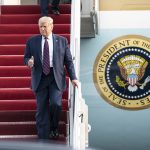In a recent appearance on a conservative news channel, Virginia Senator Mark Warner discussed the pressing need for regulations regarding artificial intelligence (AI) and the geopolitical landscape surrounding it. As the chair of the Senate Intelligence Committee, Warner noted the increasing bipartisan discussions about the risks of AI, but he lamented the lack of concrete legislation. The AI race, fueled by various nations, particularly China, has raised serious national security concerns, and Warner emphasized the urgency of establishing guardrails before technology runs amok.
In his analysis, Warner highlighted that the United States currently leads in AI technology. However, nations like Saudi Arabia and the United Arab Emirates are closing the gap, seeking American technology to bolster their standing on the global stage. Warner pointed out that without proactive measures, the U.S. could lose its technological edge. He stressed the importance of investing in small modular nuclear reactors to power the vast data centers needed to support AI innovations, which require enormous energy resources.
Warner expressed concerns about the fast-paced development of AI, likening it to previous instances where technology advanced without adequate safety measures in place. A prime example of this oversight is seen in recent cybersecurity breaches, which resulted from telecom companies prioritizing speed over security. He raised alarms about the potential for AI to manipulate markets and influence elections, echoing fears that unregulated AI could leverage similar tactics. The senator advocated for rigorous oversight to protect young users from non-consensual image use, emphasizing that similar safeguards should have been introduced during the early days of social media.
The senator also touched upon the idea of a “Geneva Convention” for AI in warfare, acknowledging the difficulty of garnering compliance from authoritarian regimes like Russia and China. Even though U.S. companies lead in developing advanced AI models, he noted that open-source models could easily be exploited by other countries, raising the stakes for an international standard of care. Warner was cautious, realizing that these authoritarian states may not adhere to any agreements made.
Finally, turning his focus to the Middle East and the conflict in Syria, Warner expressed grave concern over the potential collapse of the Assad regime. With insurgents taking control of Aleppo, the largest city in Syria, Warner underscored the threat this poses given the significant military assets and chemical weapons the regime possesses. He argued that Russia and Iran’s support for authoritarian figures like Assad only exacerbates instability in the region. As the conflict in Ukraine unfolds, Warner warned against complacency, reiterating that Ukraine has already dismantled a substantial portion of Russian military capabilities. He cautiously anticipated the political landscape under a potential future Trump Administration, concerned about sustaining support for Ukraine in its fight against Russian aggression.
In summary, Senator Warner’s insights paint a complex picture of the interrelationship between AI technology and global security dynamics. With rising threats and the need for regulations, the senator’s plea for a proactive approach emphasizes that technology must advance responsibly, lest the U.S. lose its competitive edge and risk greater exposure to global dangers.




